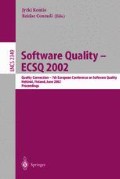Abstract
Narrow focus is the key to success for organizations of all kinds and sizes. Focus can be diluted by emphasizing the “wrong kind” of software process improvement. That’s right: traditional software process improvement may impede the successful development and deliver software, particularly innovative and total solutions. In fact, adherence to traditional software process improvement can cause an organization to become blind to competitive forces. This presentation gives a preview of a new set of improvements that are tailored to the new styles of software development and to the new market realities about time to market, our tolerance of quality concerns, and relentless focus on convenience.
Access this chapter
Tax calculation will be finalised at checkout
Purchases are for personal use only
Preview
Unable to display preview. Download preview PDF.
References
Fred Crawford and Ryan Mathews. (2001). The Myth of Excellence: Why Great Companies Never Try to Be the Best at Everything, Crown Pub. [“To research purchasing behavior, the authors surveyed 5,000 consumers, but the responses they got surprised them and prompted their title’s contrary proposition. Crawford and Mathews found that values (respect, honesty, trust, dignity) were more important to consumers than value. This discovery led the pair to develop a new model of ‘consumer relevancy.’ They explain in detail the importance of price, service, quality, access, and experience for the consumer. They then suggest that for companies to be successful they need to dominate on only one of these five factors. On a second of the five they should stand out or differentiate themselves from their competitors; and on the remaining three they need only to be at par with others in their industry.”]
Stan Rifkin. (July/August 2001). “Why software process innovations are not adopted.” IEEE Software, vol. 10, no. 4, pp. 110–112.
Stan Rifkin. (May/June 2001). “What makes measuring software so hard?” IEEE Software, vol. 10, no. 3, pp. 41–45.
Michael Treacy and Fred Wiersma. (1995). The Discipline of Market Leaders: Choose Your Customers, Narrow Your Focus, Dominate Your Market. Addison-Wesley.
Fred Wiersema. (1996). Customer Intimacy: Pick Your Partners, Shape Your Culture, Win Together. Knowledge Exchange.
Chris Zook and James Allen. (2001). Profit From the Core: Growth Strategy in an Era of Turbulence, Harvard Business School Press. [“Spawned by a 10-year study of 2,000 firms conducted at Bain & Company, a global consultancy specializing in business strategy, Profit from the Core is based on the fundamental but oft-ignored maxim that prolonged corporate growth is most profitably achieved by concentrating on a single core business.”]
Author information
Authors and Affiliations
Editor information
Editors and Affiliations
Rights and permissions
Copyright information
© 2002 Springer-Verlag Berlin Heidelberg
About this paper
Cite this paper
Rifkin, S. (2002). Is Process Improvement Irrelevant to Produce New Era Software?. In: Kontio, J., Conradi, R. (eds) Software Quality — ECSQ 2002. ECSQ 2002. Lecture Notes in Computer Science, vol 2349. Springer, Berlin, Heidelberg. https://doi.org/10.1007/3-540-47984-8_4
Download citation
DOI: https://doi.org/10.1007/3-540-47984-8_4
Published:
Publisher Name: Springer, Berlin, Heidelberg
Print ISBN: 978-3-540-43749-9
Online ISBN: 978-3-540-47984-0
eBook Packages: Springer Book Archive

